#sinclair lewis
Photo

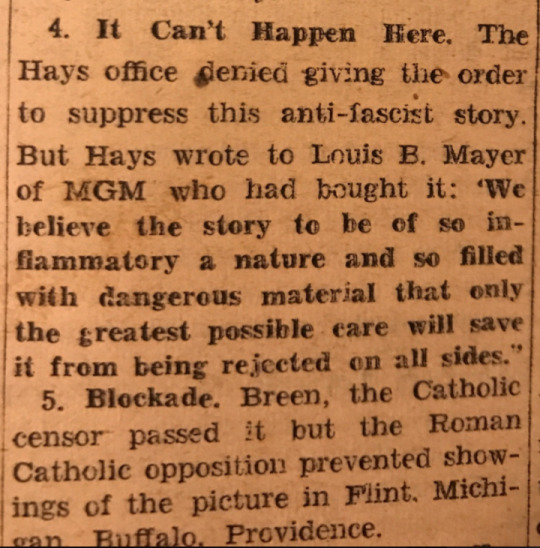
The Hays Code prevented MGM from making an anti-fascist film and later denied it.
644 notes
·
View notes
Text

Sinclair Lewis, February 7, 1885 – January 10, 1951.
28 notes
·
View notes
Text

26 notes
·
View notes
Text
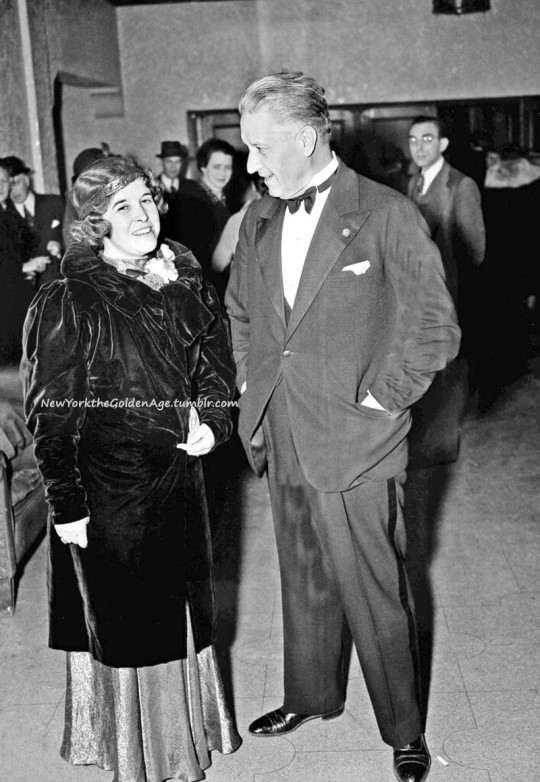
Hallie Flanagan, the national director of the Federal Theater Project, and Fred Niblo, a former vaudevillian and Hollywood director, arrive for the opening of It Can't Happen Here, October 26, 1936. The play, about a fascist dictator who becomes president of the United States, was adapted from the novel by Sinclair Lewis.
Photo: RB for the Associated Press
#vintage New York#1930s#Hallie Flanagan#Federal Theater Project#New Deal#Oct. 26#theater#26 Oct.#Sinclair Lewis#fascism#Fred Niblo#vintage Broadway#vintage theater
44 notes
·
View notes
Text
https://www.instagram.com/reel/CxX-Vkdus7_/?igshid=MTc4MmM1YmI2Ng==
Watch this, with the SOUND ON, then remember the words of Sinclair Lewis 80+ years ago:
"Why, there’s no country in the world that can get more hysterical—yes, or more obsequious!—than America. Look how Huey Long became absolute monarch over Louisiana, and how the Right Honorable Mr. Senator Berzelius Windrip owns his State. Listen to Bishop Prang and Father Coughlin on the radio—divine oracles, to millions. Remember how casually most Americans have accepted Tammany grafting and Chicago gangs and the crookedness of so many of President Harding’s appointees? Could Hitler’s bunch, or Windrip’s, be worse? Remember the Kuklux Klan? Remember our war hysteria, when we called sauerkraut ‘Liberty cabbage’ and somebody actually proposed calling German measles ‘Liberty measles’? And wartime censorship of honest papers? Bad as Russia! Remember our kissing the—well, the feet of Billy Sunday, the million-dollar evangelist, and of Aimée McPherson, who swam from the Pacific Ocean clear into the Arizona desert and got away with it? Remember Voliva and Mother Eddy?. . .Remember our Red scares and our Catholic scares, when all well-informed people knew that the O.G.P.U. were hiding out in Oskaloosa, and the Republicans campaigning against Al Smith told the Carolina mountaineers that if Al won the Pope would illegitimatize their children? Remember Tom Heflin and Tom Dixon? Remember when the hick legislators in certain states, in obedience to William Jennings Bryan, who learned his biology from his pious old grandma, set up shop as scientific experts and made the whole world laugh itself sick by forbidding the teaching of evolution?. . .Remember the Kentucky night-riders? Remember how trainloads of people have gone to enjoy lynchings? Not happen here? Prohibition—shooting down people just because they might be transporting liquor—no, that couldn’t happen in America! Why, where in all history has there ever been a people so ripe for a dictatorship as ours! We’re ready to start on a Children’s Crusade—only of adults—right now!"
It's here. And if we don't stamp it out now, the future holds much much worse.
#truthful tuesday#tt#it cant happen here#sinclair lewis#the rise of fascism#tw book burning#gop#this is a true story#your legacy
25 notes
·
View notes
Text

"When fascism comes to American, it will be wrapped in the flag and carrying a bible." -Sinclair Lewis
12 notes
·
View notes
Text
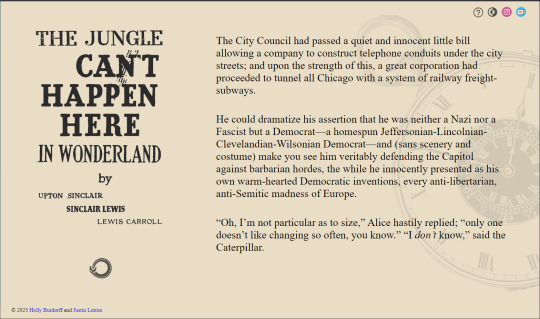
My partner Justin and I made a website! From the info page:
The Jungle Can’t Happen Here In Wonderland is a digital toy that collages random quotations from three classic works of literature. Each press of the snake compiles a trio of random excerpts, one from Upton Sinclair’s The Jungle (1906), Sinclair Lewis’s It Can’t Happen Here (1935), and Lewis Carroll’s Alice in Wonderland (1865), respectively.
Learn more & play at www.thejunglecan.com!
#art#literary#sinclair lewis#upton sinclair#the jungle#alice in wonderland#lewis carroll#electronic literature#games#card pull cames#socialism#labor#unions#comedy#dark humor#absurdism#talking caterpillars#history repeats itself#classic lit#interactive literature#literature games#collage#collage art
11 notes
·
View notes
Text
It Can't Happen Here, Sinclair Lewis
Chapter 35-36
CHAPTER XXXV
IN his two years of dictatorship, Berzelius Windrip daily became more a miser of power. He continued to tell himself that his main ambition was to make all citizens healthy, in purse and mind, and that if he was brutal it was only toward fools and reactionaries who wanted the old clumsy systems. But after eighteen months of Presidency he was angry that Mexico and Canada and South America (obviously his own property, by manifest destiny) should curtly answer his curt diplomatic notes and show no helpfulness about becoming part of his inevitable empire.
And daily he wanted louder, more convincing Yeses from everybody about him. How could he carry on his heartbreaking labor if nobody ever encouraged him? he demanded. Anyone, from Sarason to inter-office messenger, who did not play valet to his ego he suspected of plotting against him. He constantly increased his bodyguard, and as constantly distrusted all his guards and discharged them, and once took a shot at a couple of them, so that in all the world he had no companion save his old aide Lee Sarason, and perhaps Hector Macgoblin, to whom he could talk easily.
He felt lonely in the hours when he wanted to shuck off the duties of despotism along with his shoes and his fine new coat. He no longer went out racketing. His cabinet begged him not to clown in barrooms and lodge entertainments; it was not dignified, and it was dangerous to be too near to strangers.
So he played poker with his bodyguard, late at night, and at such times drank too much, and he cursed them and glared with bulging eyes whenever he lost, which, for all the good-will of his guards about letting him win, had to be often, because he pinched their salaries badly and locked up the spoons. He had become as unbouncing and unbuzzing a Buzz as might be, and he did not know it.
All the while he loved the People just as much as he feared and detested Persons, and he planned to do something historic. Certainly! He would give each family that five thousand dollars a year just as soon now as he could arrange it.
And Lee Sarason, forever making his careful lists, as patient at his desk as he was pleasure-hungry on the couch at midnight parties, was beguiling officials to consider him their real lord and the master of Corpoism. He kept his promises to them, while Windrip always forgot. His office door became the door of ambition. In Washington, the reporters privily spoke of this assistant secretary and that general as "Sarason men." His clique was not a government within a government; it was the government itself, minus the megaphones. He had the Secretary of Corporations (a former vice-president of the American Federation of Labor) coming to him secretly every evening, to report on labor politics and in especial on such proletarian leaders as were dissatisfied with Windrip as Chief—i.e., with their own share in the swag. He had from the Secretary of the Treasury (though this functionary, one Webster Skittle, was not a lieutenant of Sarason but merely friendly) confidential reports on the affairs of those large employers who, since under Corpoism it was usually possible for a millionaire to persuade the judges in the labor-arbitration courts to look at things reasonably, rejoiced that with strikes outlawed and employers regarded as state officials, they would now be in secure power forever.
Sarason knew the quiet ways in which these reinforced industrial barons used arrests by the M.M.'s to get rid of "trouble-makers," particularly of Jewish radicals—a Jewish radical being a Jew with nobody working for him. (Some of the barons were themselves Jews; it is not to be expected that race-loyalty should be carried so insanely far as to weaken the pocketbook.)
The allegiance of all such Negroes as had the sense to be content with safety and good pay instead of ridiculous yearnings for personal integrity Sarason got by being photographed shaking hands with the celebrated Negro Fundamentalist clergyman, the Reverend Dr. Alexander Nibbs, and through the highly publicized Sarason Prizes for the Negroes with the largest families, the fastest time in floor-scrubbing, and the longest periods of work without taking a vacation.
"No danger of our good friends, the Negroes, turning Red when they're encouraged like that," Sarason announced to the newspapers.
It was a satisfaction to Sarason that in Germany, all military bands were now playing his national song, "Buzz and Buzz" along with the Horst Wessel hymn, for, though he had not exactly written the music as well as the words, the music was now being attributed to him abroad.
As a bank clerk might, quite rationally, worry equally over the whereabouts of a hundred million dollars' worth of the bank's bonds, and of ten cents of his own lunch money, so Buzz Windrip worried equally over the welfare—that is, the obedience to himself—of a hundred and thirty-odd million American citizens and the small matter of the moods of Lee Sarason, whose approval of him was the one real fame. (His wife Windrip did not see oftener than once a week, and anyway, what that rustic wench thought was unimportant.)
The diabolic Hector Macgoblin frightened him; Secretary of War Luthorne and Vice-President Perley Beecroft he liked well enough, but they bored him; they smacked too much of his own small-town boyhood, to escape which he was willing to take the responsibilities of a nation. It was the incalculable Lee Sarason on whom he depended, and the Lee with whom he had gone fishing and boozing and once, even, murdering, who had seemed his own self made more sure and articulate, had thoughts now which he could not penetrate. Lee's smile was a veil, not a revelation.
It was to discipline Lee, with the hope of bringing him back, that when Buzz replaced the amiable but clumsy Colonel Luthorne as Secretary of War by Colonel Dewey Haik, Commissioner of the Northeastern Province (Buzz's characteristic comment was that Luthorne was not "pulling his weight"), he also gave to Haik the position of High Marshal of the M.M.'s, which Lee had held along with a dozen other offices. From Lee he expected an explosion, then repentance and a new friendship. But Lee only said, "Very well, if you wish," and said it coldly.
Just how COULD he get Lee to be a good boy and come play with him again? wistfully wondered the man who now and then planned to be emperor of the world.
He gave Lee a thousand-dollar television set. Even more coldly did Lee thank him, and never spoke afterward of how well he might be receiving the still shaky television broadcasts on his beautiful new set.
As Dewey Haik took hold, doubling efficiency in both the regular army and the Minute Men (he was a demon for all-night practice marches in heavy order, and the files could not complain, because he set the example), Buzz began to wonder whether Haik might not be his new confidant.... He really would hate to throw Lee into prison, but still, Lee was so thoughtless about hurting his feelings, when he'd gone and done so much for him and all!
Buzz was confused. He was the more confused when Perley Beecroft came in and briefly said that he was sick of all this bloodshed and was going home to the farm, and as for his lofty Vice-Presidential office, Buzz knew what he could do with it.
Were these vast national dissensions no different from squabbles in his father's drugstore? fretted Buzz. He couldn't very well have Beecroft shot: it might cause criticism. But it was indecent, it was sacrilegious to annoy an emperor, and in his irritation he had an ex-Senator and twelve workmen who were in concentration camps taken out and shot on the charge that they had told irreverent stories about him.
Secretary of State Sarason was saying good-night to President Windrip in the hotel suite where Windrip really lived.
No newspaper had dared mention it, but Buzz was both bothered by the stateliness of the White House and frightened by the number of Reds and cranks and anti-Corpos who, with the most commendable patience and ingenuity, tried to sneak into that historic mansion and murder him. Buzz merely left his wife there, for show, and, except at great receptions, never entered any part of the White House save the office annex.
He liked this hotel suite; he was a sensible man, who preferred straight bourbon, codfish cakes, and deep leather chairs to Burgundy, trout bleu, and Louis Quinze. In this twelve-room apartment, occupying the entire tenth floor of a small unnotorious hotel, he had for himself only a plain bedroom, a huge living room which looked like a combination of office and hotel lobby, a large liquor closet, another closet with thirty-seven suits of clothes, and a bathroom with jars and jars of the pine-flavored bath salts which were his only cosmetic luxury. Buzz might come home in a suit dazzling as a horse blanket, one considered in Alfalfa Center a triumph of London tailoring, but, once safe, he liked to put on his red morocco slippers that were down at the heel and display his red suspenders and baby-blue sleeve garters. To feel correct in those decorations, he preferred the hotel atmosphere that, for so many years before he had ever seen the White House, had been as familiar to him as his ancestral corn cribs and Main Streets.
The other ten rooms of the suite, entirely shutting his own off from the corridors and elevators, were filled night and day with guards. To get through to Buzz in this intimate place of his own was very much like visiting a police station for the purpose of seeing a homicidal prisoner.
"Haik seems to me to be doing a fine job in the War Department, Lee," said the President. "Of course you know if you ever want the job of High Marshal back—"
"I'm quite satisfied," said the great Secretary of State.
"What do you think of having Colonel Luthorne back to help Haik out? He's pretty good on fool details."
Sarason looked as nearly embarrassed as the self-satisfied Lee Sarason ever could look.
"Why, uh—I supposed you knew it. Luthorne was liquidated in the purge ten days ago."
"Good God! Luthorne killed? Why didn't I know it?"
"It was thought better to keep it quiet. He was a pretty popular man. But dangerous. Always talking about Abraham Lincoln!"
"So I just never know anything about what's going on! Why, even the newspaper clippings are predigested, by God, before I see 'em!"
"It's thought better not to bother you with minor details, boss. You know that! Of course, if you feel I haven't organized your staff correctly—"
"Aw now, don't fly off the handle, Lee! I just meant—Of course I know how hard you've tried to protect me so I could give all my brains to the higher problems of State. But Luthorne—I kind of liked him. He always had quite a funny line when we played poker." Buzz Windrip felt lonely, as once a certain Shad Ledue had felt, in a hotel suite that differed from Buzz's only in being smaller. To forget it he bawled, very brightly, "Lee, do you ever wonder what'll happen in the future?"
"Why, I think you and I may have mentioned it."
"But golly, just think of what might happen in the future, Lee! Think of it! Why, we may be able to pull off a North American kingdom!" Buzz half meant it seriously—or perhaps quarter meant it. "How'd you like to be Duke of Georgia—or Grand Duke, or whatever they call a Grand Exalted Ruler of the Elks in this peerage business? And then how about an Empire of North and South America after that? I might make you a king under me, then—say something like King of Mexico. Howjuh like that?"
"Be very amusing," said Lee mechanically—as Lee always did say the same thing mechanically whenever Buzz repeated this same nonsense.
"But you got to stick by me and not forget all I've done for you, Lee, don't forget that."
"I never forget anything!... By the way, we ought to liquidate, or at least imprison, Perley Beecroft, too. He's still technically Vice-President of the United States, and if the lousy traitor managed some skullduggery so as to get you killed or deposed, he might be regarded by some narrow-minded literalists as President!"
"No, no, no! He's my friend, no matter what he says about me... the dirty dog!" wailed Buzz.
"All right. You're the boss. G'night," said Lee, and returned from this plumber's dream of paradise to his own gold-and-black and apricot-silk bower in Georgetown, which he shared with several handsome young M.M. officers. They were savage soldiers, yet apt at music and at poetry. With them, he was not in the least passionless, as he seemed now to Buzz Windrip. He was either angry with his young friends, and then he whipped them, or he was in a paroxysm of apology to them, and caressed their wounds. Newspapermen who had once seemed to be his friends said that he had traded the green eyeshade for a wreath of violets.
At cabinet meeting, late in 1938, Secretary of State Sarason revealed to the heads of the government disturbing news. Vice-President Beecroft—and had he not told them the man should have been shot?—had fled to Canada, renounced Corpoism, and joined Walt Trowbridge in plotting. There were bubbles from an almost boiling rebellion in the Middle West and Northwest, especially in Minnesota and the Dakotas, where agitators, some of them formerly of political influence, were demanding that their states secede from the Corpo Union and form a cooperative (indeed almost Socialistic) commonwealth of their own.
"Rats! Just a lot of irresponsible wind bags!" jeered President Windrip. "Why! I thought you were supposed to be the camera-eyed gink that kept up on everything that goes on, Lee! You forget that I myself, personally, made a special radio address to that particular section of the country last week! And I got a wonderful reaction. The Middle Westerners are absolutely loyal to me. They appreciate what I've been trying to do!"
Not answering him at all, Sarason demanded that, in order to bring and hold all elements in the country together by that useful Patriotism which always appears upon threat of an outside attack, the government immediately arrange to be insulted and menaced in a well-planned series of deplorable "incidents" on the Mexican border, and declare war on Mexico as soon as America showed that it was getting hot and patriotic enough.
Secretary of the Treasury Skittle and Attorney General Porkwood shook their heads, but Secretary of War Haik and Secretary of Education Macgoblin agreed with Sarason high-mindedly. Once, pointed out the learned Macgoblin, governments had merely let themselves slide into a war, thanking Providence for having provided a conflict as a febrifuge against internal discontent, but of course, in this age of deliberate, planned propaganda, a really modern government like theirs must figure out what brand of war they had to sell and plan the selling-campaign consciously. Now, as for him, he would be willing to leave the whole set-up to the advertising genius of Brother Sarason.
"No, no, no!" cried Windrip. "We're not ready for a war! Of course, we'll take Mexico some day. It's our destiny to control it and Christianize it. But I'm scared that your darn scheme might work just opposite to what you say. You put arms into the hands of too many irresponsible folks, and they might use 'em and turn against you and start a revolution and throw the whole dern gang of us out! No, no! I've often wondered if the whole Minute Men business, with their arms and training, may not be a mistake. That was your idea, Lee, not mine!"
Sarason spoke evenly: "My dear Buzz, one day you thank me for originating that 'great crusade of citizen soldiers defending their homes'—as you love to call it on the radio—and the next day you almost ruin your clothes, you're so scared of them. Make up your mind one way or the other!"
Sarason walked out of the room, not bowing.
Windrip complained, "I'm not going to stand for Lee's talking to me like that! Why, the dirty double-crosser, I made him! One of these days, he'll find a new secretary of state around this joint! I s'pose he thinks jobs like that grow on every tree! Maybe he'd like to be a bank president or something—I mean, maybe he'd like to be Emperor of England!"
President Windrip, in his hotel bedroom, was awakened late at night by the voice of a guard in the outer room: "Yuh, sure, let him pass—he's the Secretary of State." Nervously the President clicked on his bedside lamp... . He had needed it lately, to read himself to sleep.
In that limited glow he saw Lee Sarason, Dewey Haik, and Dr. Hector Macgoblin march to the side of his bed. Lee's thin sharp face was like flour. His deep-buried eyes were those of a sleepwalker. His skinny right hand held a bowie knife which, as his hand deliberately rose, was lost in the dimness. Windrip swiftly thought: Sure would be hard to know where to buy a dagger, in Washington; and Windrip thought: All this is the doggonedest foolishness—just like a movie or one of these old history books when you were a kid; and Windrip thought, all in that same flash: Good God, I'm going to be killed!
He cried out, "Lee! You couldn't do that to me!"
Lee grunted, like one who has detected a bad smell.
Then the Berzelius Windrip who could, incredibly, become President really awoke: "Lee! Do you remember the time when your old mother was so sick, and I gave you my last cent and loaned you my flivver so you could go see her, and I hitch-hiked to my next meeting? Lee!"
"Hell. I suppose so. General."
"Yes?" answered Dewey Haik, not very pleasantly.
"I think we'll stick him on a destroyer or something and let him sneak off to France or England.... The lousy coward seems afraid to die.... Of course, we'll kill him if he ever does dare to come back to the States. Take him out and phone the Secretary of the Navy for a boat and get him on it, will you?"
"Very well, sir," said Haik, even less pleasantly.
It had been easy. The troops, who obeyed Haik, as Secretary of War, had occupied all of Washington.
Ten days later Buzz Windrip was landed in Havre and went sighingly to Paris. It was his first view of Europe except for one twenty-one-day Cook's Tour. He was profoundly homesick for Chesterfield cigarettes, flapjacks, Moon Mullins, and the sound of some real human being saying "Yuh, what's bitin' you?" instead of this perpetual sappy "oui?"
In Paris he remained, though he became the sort of minor hero of tragedy, like the ex-King of Greece, Kerensky, the Russian Grand Dukes, Jimmy Walker, and a few ex-presidents from South America and Cuba, who is delighted to accept invitations to drawing rooms where the champagne is good enough and one may have a chance of finding people, now and then, who will listen to one's story and say "sir."
At that, though, Buzz chuckled, he had kinda put it over on those crooks, for during his two sweet years of despotism he had sent four million dollars abroad, to secret, safe accounts. And so Buzz Windrip passed into wabbly paragraphs in recollections by ex-diplomatic gentlemen with monocles. In what remained of Ex-President Windrip's life, everything was ex. He was even so far forgotten that only four or five American students tried to shoot him.
The more dulcetly they had once advised and flattered Buzz, the more ardently did most of his former followers, Macgoblin and Senator Porkwood and Dr. Almeric Trout and the rest, turn in loud allegiance to the new President, the Hon. Lee Sarason.
He issued a proclamation that he had discovered that Windrip had been embezzling the people's money and plotting with Mexico to avoid war with that guilty country; and that he, Sarason, in quite alarming grief and reluctance, since he more than anyone else had been deceived by his supposed friend, Windrip, had yielded to the urging of the Cabinet and taken over the Presidency, instead of Vice-President Beecroft, the exiled traitor.
President Sarason immediately began appointing the fancier of his young officer friends to the most responsible offices in State and army. It amused him, seemingly, to shock people by making a pink-cheeked, moist-eyed boy of twenty-five Commissioner of the Federal District, which included Washington and Maryland. Was he not supreme, was he not semi-divine, like a Roman emperor? Could he not defy all the muddy mob that he (once a Socialist) had, for its weak shiftlessness, come to despise?
"Would that the American people had just one neck!" he plagiarized, among his laughing boys.
In the decorous White House of Coolidge and Harrison and Rutherford Birchard Hayes he had orgies (an old name for "parties") with weaving limbs and garlands and wine in pretty fair imitations of Roman beakers.
It was hard for imprisoned men like Doremus Jessup to believe it, but there were some tens of thousands of Corpos, in the M.M.'s, in civil service, in the army, and just in private ways, to whom Sarason's flippant régime was tragic.
They were the Idealists of Corpoism, and there were plenty of them, along with the bullies and swindlers; they were the men and women who, in 1935 and 1936, had turned to Windrip & Co., not as perfect, but as the most probable saviors of the country from, on one hand, domination by Moscow and, on the other hand, the slack indolence, the lack of decent pride of half the American youth, whose world (these idealists asserted) was composed of shiftless distaste for work and refusal to learn anything thoroughly, of blatting dance music on the radio, maniac automobiles, slobbering sexuality, the humor and art of comic strips—of a slave psychology which was making America a land for sterner men to loot.
General Emmanuel Coon was one of the Corpo Idealists.
Such men did not condone the murders under the Corpo régime. But they insisted, "This is a revolution, and after all, when in all history has there been a revolution with so little bloodshed?"
They were aroused by the pageantry of Corpoism: enormous demonstrations, with the red-and-black flags a flaunting magnificence like storm clouds. They were proud of new Corpo roads, hospitals, television stations, aeroplane lines; they were touched by processions of the Corpo Youth, whose faces were exalted with pride in the myths of Corpo heroism and clean Spartan strength and the semi-divinity of the all-protecting Father, President Windrip. They believed, they made themselves believe, that in Windrip had come alive again the virtues of Andy Jackson and Farragut and Jeb Stuart, in place of the mob cheapness of the professional athletes who had been the only heroes of 1935.
They planned, these idealists, to correct, as quickly as might be, the errors of brutality and crookedness among officials. They saw arising a Corpo art, a Corpo learning, profound and real, divested of the traditional snobbishness of the old-time universities, valiant with youth, and only the more beautiful in that it was "useful." They were convinced that Corpoism was Communism cleansed of foreign domination and the violence and indignity of mob dictatorship; Monarchism with the chosen hero of the people for monarch; Fascism without grasping and selfish leaders; freedom with order and discipline; Traditional America without its waste and provincial cockiness.
Like all religious zealots, they had blessed capacity for blindness, and they were presently convinced that (since the only newspapers they ever read certainly said nothing about it) there were no more of blood-smeared cruelties in court and concentration camp; no restrictions of speech or thought. They believed that they never criticized the Corpo régime not because they were censored, but because "that sort of thing was, like obscenity, such awfully bad form."
And these idealists were as shocked and bewildered by Sarason's coup d'état against Windrip as was Mr. Berzelius Windrip himself.
The grim Secretary of War, Haik, scolded at President Sarason for his influence on the nation, particularly on the troops. Lee laughed at him, but once he was sufficiently flattered by Haik's tribute to his artistic powers to write a poem for him. It was a poem which was later to be sung by millions; it was, in fact, the most popular of the soldiers' ballads which were to spring automatically from anonymous soldier bards during the war between the United States and Mexico. Only, being as pious a believer in Modern Advertising as Sarason himself, the efficient Haik wanted to encourage the spontaneous generation of these patriotic folk ballads by providing the automatic springing and the anonymous bard. He had as much foresight, as much "prophetic engineering," as a motorcar manufacturer.
Sarason was as eager for war with Mexico (or Ethiopia or Siam or Greenland or any other country that would provide his pet young painters with a chance to portray Sarason being heroic amid curious vegetation) as Haik; not only to give malcontents something outside the country to be cross about, but also to give himself a chance to be picturesque. He answered Haik's request by writing a rollicking military chorus at a time while the country was still theoretically entirely friendly with Mexico. It went to the tune of "Mademoiselle from Armentières"—or "Armenteers." If the Spanish in it was a little shaky, still, millions were later to understand that "Habla oo?" stood for "¿Habla usted?" signifying "Parlez-vous?" It ran thus, as it came from Sarason's purple but smoking typewriter:
Señorita from Guadalupe,
Qui usted?
Señorita go roll your hoop,
Or come to bed!
Señorita from Guadalupe
If Padre sees us we're in the soup,
Hinky, dinky, habla oo?
Señorita from Monterey,
Savvy Yank?
Señorita what's that you say?
You're Swede, Ay tank!
But Señorita from Monterey,
You won't hablar when we hit the hay,
Hinky, dinky, habla oo?
Señorita from Mazatlán,
Once we've met,
You'll smile all over your khaki pan,
You wont forget!
For days you'll holler, "Oh, what a man!"
And you'll never marry a Mexican.
Hinky, dinky, habla oo?
If at times President Sarason seemed flippant, he was not at all so during his part in the scientific preparation for war which consisted in rehearsing M.M. choruses in trolling out this ditty with well-trained spontaneity.
His friend Hector Macgoblin, now Secretary of State, told Sarason that this manly chorus was one of his greatest creations. Macgoblin, though personally he did not join in Sarason's somewhat unusual midnight diversions, was amused by them, and he often told Sarason that he was the only original creative genius among this whole bunch of stuffed shirts, including Haik.
"You want to watch that cuss Haik, Lee," said Macgoblin. "He's ambitious, he's a gorilla, and he's a pious Puritan, and that's a triple combination I'm scared of. The troops like him."
"Rats! He has no attraction for them. He's just an accurate military bookkeeper," said Sarason.
That night he had a party at which, for a novelty, rather shocking to his intimates, he actually had girls present, performing certain curious dances. The next morning Haik rebuked him, and—Sarason had a hangover—was stormed at. That night, just a month after Sarason had usurped the Presidency, Haik struck.
There was no melodramatic dagger-and-uplifted-arm business about it, this time—though Haik did traditionally come late, for all Fascists, like all drunkards, seem to function most vigorously at night. Haik marched into the White House with his picked storm troops, found President Sarason in violet silk pajamas among his friends, shot Sarason and most of his companions dead, and proclaimed himself President.
Hector Macgoblin fled by aeroplane to Cuba, then on. When last seen, he was living high up in the mountains of Haiti, wearing only a singlet, dirty white-drill trousers, grass sandals, and a long tan beard; very healthy and happy, occupying a one-room hut with a lovely native girl, practicing modern medicine and studying ancient voodoo.
When Dewey Haik became President, then America really did begin to suffer a little, and to long for the good old democratic, liberal days of Windrip.
Windrip and Sarason had not minded mirth and dancing in the street so long as they could be suitably taxed. Haik disliked such things on principle. Except, perhaps, that he was an atheist in theology, he was a strict orthodox Christian. He was the first to tell the populace that they were not going to get any five thousand dollars a year but, instead, "reap the profits of Discipline and of the Scientific Totalitarian State not in mere paper figures but in vast dividends of Pride, Patriotism, and Power." He kicked out of the army all officers who could not endure marching and going thirsty; and out of the civil branch all commissioners—including one Francis Tasbrough—who had garnered riches too easily and too obviously.
He treated the entire nation like a well-run plantation, on which the slaves were better fed than formerly, less often cheated by their overseers, and kept so busy that they had time only for work and for sleep, and thus fell rarely into the debilitating vices of laughter, song (except war songs against Mexico), complaint, or thinking. Under Haik there were less floggings in M.M. posts and in concentration camps, for by his direction officers were not to waste time in the sport of beating persons, men, women, or children, who asserted that they didn't care to be slaves on even the best plantation, but just to shoot them out of hand.
Haik made such use of the clergy—Protestant, Catholic, Jewish, and Liberal-Agnostic—as Windrip and Sarason never had. While there were plenty of ministers who, like Mr. Falck and Father Stephen Perefixe, like Cardinal Faulhaber and Pastor Niemoeller in Germany, considered it some part of Christian duty to resent the enslavement and torture of their appointed flocks, there were also plenty of reverend celebrities, particularly large-city pastors whose sermons were reported in the newspapers every Monday morning, to whom Corpoism had given a chance to be noisily and lucratively patriotic. These were the chaplains-at-heart, who, if there was no war in which they could humbly help to purify and comfort the poor brave boys who were fighting, were glad to help provide such a war.
These more practical shepherds, since like doctors and lawyers they were able to steal secrets out of the heart, became valued spies during the difficult months after February, 1939, when Haik was working up war with Mexico. (Canada? Japan? Russia? They would come later.) For even with an army of slaves, it was necessary to persuade them that they were freemen and fighters for the principle of freedom, or otherwise the scoundrels might cross over and join the enemy!
So reigned the good king Haik, and if there was anyone in all the land who was discontented, you never heard him speak—not twice.
And in the White House, where under Sarason shameless youths had danced, under the new reign of righteousness and the blackjack, Mrs. Haik, a lady with eyeglasses and a smile of resolute cordiality, gave to the W.C.T.U., the Y.W.C.A., and the Ladies' League against Red Radicalism, and their inherently incidental husbands, a magnified and hand-colored Washington version of just such parties as she had once given in the Haik bungalow in Eglantine, Oregon.
CHAPTER XXXVI
THE ban on information at the Trianon camp had been raised; Mrs. Candy had come calling on Doremus—complete with cocoanut layer cake—and he had heard of Mary's death, the departure of Emma and Sissy, the end of Windrip and Sarason. And none of it seemed in the least real—not half so real and, except for the fact that he would never see Mary again, not half so important as the increasing number of lice and rats in their cell.
During the ban, they had celebrated Christmas by laughing, not very cheerfully, at the Christmas tree Karl Pascal had contrived out of a spruce bough and tinfoil from cigarette packages. They had hummed "Stille Nacht" softly in the darkness, and Doremus had thought of all their comrades in political prisons in America, Europe, Japan, India.
But Karl, apparently, thought of comrades only if they were saved, baptized Communists. And, forced together as they were in a cell, the growing bitterness and orthodox piety of Karl became one of Doremus's most hateful woes; a tragedy to be blamed upon the Corpos, or upon the principle of dictatorship in general, as savagely as the deaths of Mary and Dan Wilgus and Henry Veeder. Under persecution, Karl lost no ounce of his courage and his ingenuity in bamboozling the M.M. guards, but day by day he did steadily lose all his humor, his patience, his tolerance, his easy companionship, and everything else that made life endurable to men packed in a cell. The Communism that had always been his King Charles's Head, sometimes amusing, became a religious bigotry as hateful to Doremus as the old bigotries of the Inquisition or the Fundamentalist Protestants; that attitude of slaughtering to save men's souls from which the Jessup family had escaped during these last three generations.
It was impossible to get away from Karl's increasing zeal. He chattered on at night for an hour after all the other five had growled, "Oh, shut up! I want to sleep! You'll be making a Corpo out of me!"
Sometimes, in his proselytizing, he conquered. When his cell mates had long enough cursed the camp guards, Karl would rebuke them: "You're a lot too simple when you explain everything by saying that the Corpos, especially the M.M.'s, are all fiends. Plenty of 'em are. But even the worst of 'em, even the professional gunmen in the M.M. ranks, don't get as much satisfaction out of punishing us heretics as the honest, dumb Corpos who've been misled by their leaders' mouthing about Freedom, Order, Security, Discipline, Strength! All those swell words that even before Windrip came in the speculators started using to protect their profits! Especially how they used the word 'Liberty'! Liberty to steal the didies off the babies! I tell you, an honest man gets sick when he hears the word 'Liberty' today, after what the Republicans did to it! And I tell you that a lot of the M.M. guards right here at Trianon are just as unfortunate as we are—lot of 'em are just poor devils that couldn't get decent work, back in the Golden Age of Frank Roosevelt—bookkeepers that had to dig ditches, auto agents that couldn't sell cars and went sour, ex-looeys in the Great War that came back to find their jobs pinched off 'em and that followed Windrip, quite honestly, because they thought, the saps, that when he said Security he meant Security! They'll learn!"
And having admirably discoursed for another hour on the perils of self-righteousness among the Corpos, Comrade Pascal would change the subject and discourse upon the glory of self-righteousness among the Communists—particularly upon those sanctified examples of Communism who lived in bliss in the Holy City of Moscow, where, Doremus judged, the streets were paved with undepreciable roubles.
The Holy City of Moscow! Karl looked upon it with exactly such uncritical and slightly hysterical adoration as other sectarians had in their day devoted to Jerusalem, Mecca, Rome, Canterbury, and Benares. Fine, all right, thought Doremus. Let 'em worship their sacred fonts—it was as good a game as any for the mentally retarded. Only, why then should they object to his considering as sacred Fort Beulah, or New York, or Oklahoma City?
Karl once fell into a froth because Doremus wondered if the iron deposits in Russia were all they might be. Why certainly! Russia, being Holy Russia, must, as a useful part of its holiness, have sufficient iron, and Karl needed no mineralogists' reports but only the blissful eye of faith to know it.
He did not mind Karl's worshiping Holy Russia. But Karl did, using the word "naïve," which is the favorite word and just possibly the only word known to Communist journalists, derisively mind when Doremus had a mild notion of worshiping Holy America. Karl spoke often of photographs in the Moscow News of nearly naked girls on Russian bathing-beaches as proving the triumph and joy of the workers under Bolshevism, but he regarded precisely the same sort of photographs of nearly naked girls on Long Island bathing-beaches as proving the degeneration of the workers under Capitalism.
As a newspaper man, Doremus remembered that the only reporters who misrepresented and concealed facts more unscrupulously than the Capitalists were the Communists.
He was afraid that the world struggle today was not of Communism against Fascism, but of tolerance against the bigotry that was preached equally by Communism and Fascism. But he saw too that in America the struggle was befogged by the fact that the worst Fascists were they who disowned the word "Fascism" and preached enslavement to Capitalism under the style of Constitutional and Traditional Native American Liberty. For they were thieves not only of wages but of honor. To their purpose they could quote not only Scripture but Jefferson.
That Karl Pascal should be turning into a zealot, like most of his chiefs in the Communist party, was grievous to Doremus because he had once simple-heartedly hoped that in the mass strength of Communism there might be an escape from cynical dictatorship. But he saw now that he must remain alone, a "Liberal," scorned by all the noisier prophets for refusing to be a willing cat for the busy monkeys of either side. But at worst, the Liberals, the Tolerant, might in the long run preserve some of the arts of civilization, no matter which brand of tyranny should finally dominate the world.
"More and more, as I think about history," he pondered, "I am convinced that everything that is worth while in the world has been accomplished by the free, inquiring, critical spirit, and that the preservation of this spirit is more important than any social system whatsoever. But the men of ritual and the men of barbarism are capable of shutting up the men of science and of silencing them forever."
Yes, this was the worst thing the enemies of honor, the pirate industrialists and then their suitable successors, the Corpos with their blackjacks, had done: it had turned the brave, the generous, the passionate and half-literate Karl Pascals into dangerous fanatics. And how well they had done it! Doremus was uncomfortable with Karl; he felt that his next turn in jail might be under the wardenship of none other than Karl himself, as he remembered how the Bolsheviks, once in power, had most smugly imprisoned and persecuted those great women, Spiridinova and Breshkovskaya and Ismailovitch, who, by their conspiracies against the Czar, their willingness to endure Siberian torture on behalf of "freedom for the masses," had most brought on the revolution by which the Bolsheviks were able to take control—and not only again forbid freedom to the masses, but this time inform them that, anyway, freedom was just a damn silly bourgeois superstition.
So Doremus, sleeping two-and-a-half feet above his old companion, felt himself in a cell within a cell. Henry Veeder and Clarence Little and Victor Loveland and Mr. Falck were gone now, and to Julian, penned in solitary, he could not speak once a month.
He yearned for escape with a desire that was near to insanity; awake and asleep it was his obsession; and he thought his heart had stopped when Squad-Leader Aras Dilley muttered to him, as Doremus was scrubbing a lavatory floor, "Say! Listen, Mr. Jessup! Mis' Pike is fixin' it up and I'm going to help you escape jus' soon as things is right!"
It was a question of the guards on sentry-go outside the quadrangle. As sweeper, Doremus was reasonably free to leave his cell, and Aras had loosened the boards and barbed wire at the end of one of the alleys leading from the quadrangle between buildings. But outside, he was likely to be shot by a guard on sight.
For a week Aras watched. He knew that one of the night guards had a habit of getting drunk, which was forgiven him because of his excellence in flogging troublemakers but which was regarded by the more judicious as rather regrettable. And for that week Aras fed the guard's habit on Lorinda's expense money, and was indeed so devoted to his duties that he was himself twice carried to bed. Snake Tizra grew interested—but Snake also, after the first couple of drinks, liked to be democratic with his men and to sing "The Old Spinning-Wheel."
Aras confided to Doremus: "Mis' Pike—she don't dast send you a note, less somebody get hold of it, but she says to me to tell you not to tell anybody you're going to take a sneak, or it'll get out."
So on the evening when Aras jerked a head at him from the corridor, then rasped, surly-seeming, "Here you, Jessup—you left one of the cans all dirty!" Doremus looked mildly at the cell that had been his home and study and tabernacle for six months, glanced at Karl Pascal reading in his bunk—slowly waving a shoeless foot in a sock with the end of it gone, at Truman Webb darning the seat of his pants, noted the gray smoke in filmy tilting layers about the small electric bulb in the ceiling, and silently stepped out into the corridor.
The late-January night was foggy.
Aras handed him a worn M.M. overcoat, whispered, "Third alley on right; moving-van on corner opposite the church," and was gone.
On hands and knees Doremus briskly crawled under the loosened barbed wire at the end of the small alley and carelessly stepped out, along the road. The only guard in sight was at a distance, and he was wavering in his gait. A block away, a furniture van was jacked up while the driver and his helper painfully prepared to change one of the tremendous tires. In the light of a corner arc, Doremus saw that the driver was that same hard-faced long-distance cruiser who had carried bundles of tracts for the New Underground.
The driver grunted, "Get in—hustle!" Doremus crouched between a bureau and a wing chair inside.
Instantly he felt the tilted body of the van dropping, as the driver pulled out the jack, and from the seat he heard, "All right! We're off. Crawl up behind me here and listen, Mr. Jessup.... Can you hear me?... The M.M.'s don't take so much trouble to prevent you gents and respectable fellows from escaping. They figure that most of you are too scary to try out anything, once you're away from your offices and front porches and sedans. But I guess you may be different, some ways, Mr. Jessup. Besides, they figure that if you do escape, they can pick you up easy afterwards, because you ain't onto hiding out, like a regular fellow that's been out of work sometimes and maybe gone on the bum. But don't worry. We'll get you through. I tell you, there's nobody got friends like a revolutionist.... and enemies!"
Then first did it come to Doremus that, by sentence of the late lamented Effingham Swan, he was subject to the death penalty for escaping. But "Oh, what the hell!" he grunted, like Karl Pascal, and he stretched in the luxury of mobility, in that galloping furniture truck.
He was free! He saw the lights of villages going by!
Once, he was hidden beneath hay in a barn; again, in a spruce grove high on a hill; and once he slept overnight on top of a coffin in the establishment of an undertaker. He walked secret paths; he rode in the back of an itinerant medicine-peddler's car and, concealed in fur cap and high-collared fur coat, in the sidecar of an Underground worker serving as an M.M. squad-leader. From this he dismounted, at the driver's command, in front of an obviously untenanted farmhouse on a snaky back-road between Monadnock Mountain and the Averill lakes—a very slattern of an old unpainted farmhouse, with sinking roof and snow up to the frowsy windows.
It seemed a mistake.
Doremus knocked, as the motorcycle snarled away, and the door opened on Lorinda Pike and Sissy, crying together, "Oh, my dear!"
He could only mutter, "Well!"
When they had made him strip off his fur coat in the farmhouse living room, a room with peeling wall paper, and altogether bare except for a cot, two chairs, a table, the two moaning women saw a small man, his face dirty, pasty, and sunken as by tuberculosis, his once fussily trimmed beard and mustache ragged as wisps of hay, his overlong hair a rustic jag at the back, his clothes ripped and filthy—an old, sick, discouraged tramp. He dropped on a straight chair and stared at them. Maybe they were genuine—maybe they really were there—maybe he was, as it seemed, in heaven, looking at the two principal angels, but he had been so often fooled so cruelly in his visions these dreary months! He sobbed, and they comforted him with softly stroking hands and not too confoundedly much babble.
"I've got a hot bath for you! And I'll scrub your back! And then some hot chicken soup and ice cream!"
As though one should say: The Lord God awaits you on His throne and all whom you bless shall be blessed, and all your enemies brought to their knees!
Those sainted women had actually had a long tin tub fetched to the kitchen of the old house, filled it with water heated in kettle and dishpan on the stove, and provided brushes, soap, a vast sponge, and such a long caressing bath towel as Doremus had forgotten existed. And somehow, from Fort Beulah, Sissy had brought plenty of his own shoes and shirts and three suits that now seemed to him fit for royalty.
He who had not had a hot bath for six months, and for three had worn the same underclothes, and for two (in clammy winter) no socks whatever!
If the presence of Lorinda and Sissy was token of heaven, to slide inch by slow ecstatic inch into the tub was its proof, and he lay soaking in glory.
When he was half dressed, the two came in, and there was about as much thought of modesty, or need for it, as though he were the two-year-old babe he somewhat resembled. They were laughing at him, but laughter became sharp whimpers of horror when they saw the gridironed meat of his back. But nothing more demanding than "Oh, my dear!" did Lorinda say, even then.
Though Sissy had once been glad that Lorinda spared her any mothering, Doremus rejoiced in it. Snake Tizra and the Trianon concentration camp had been singularly devoid of any mothering. Lorinda salved his back and powdered it. She cut his hair, not too unskillfully. She cooked for him all the heavy, earthy dishes of which he had dreamed, hungry in a cell: hamburg steak with onions, corn pudding, buckwheat cakes with sausages, apple dumplings with hard and soft sauce, and cream of mushroom soup!
It had not been safe to take him to the comforts of her tea room at Beecher Falls; already M.M.'s had been there, snooping after him. But Sissy and she had, for such refugees as they might be forwarding for the New Underground, provided this dingy farmhouse with half-a-dozen cots, and rich stores of canned goods and beautiful bottles (Doremus considered them) of honey and marmalade and bar-le-duc. The actual final crossing of the border into Canada was easier than it had been when Buck Titus had tried to smuggle the Jessup family over. It had become a system, as in the piratical days of bootlegging; with new forest paths, bribery of frontier guards, and forged passports. He was safe. Yet just to make safety safer, Lorinda and Sissy, rubbing their chins as they looked Doremus over, still discussing him as brazenly as though he were a baby who could not understand them, decided to turn him into a young man.
"Dye his hair and mustache black and shave the beard, I think. I wish we had time to give him a nice Florida tan with an Alpine lamp, too," considered Lorinda.
"Yes, I think he'll look sweet that way," said Sissy.
"I will not have my beard off!" he protested. "How do I know what kind of a chin I'll have when it's naked?"
"Why, the man still thinks he's a newspaper proprietor and one of Fort Beulah's social favorites!" marveled Sissy as they ruthlessly set to work.
"Only real reason for these damn wars and revolutions anyway is that the womenfolks get a chance—ouch! be careful!—to be dear little Amateur Mothers to every male they can get in their clutches. Hair dye!" said Doremus bitterly.
But he was shamelessly proud of his youthful face when it was denuded, and he discovered that he had a quite tolerably stubborn chin, and Sissy was sent back to Beecher Falls to keep the tea room alive, and for three days Lorinda and he gobbled steaks and ale, and played pinochle, and lay talking infinitely of all they had thought about each other in the six desert months that might have been sixty years. He was to remember the sloping farmhouse bedroom and a shred of rag carpet and a couple of rickety chairs and Lorinda snuggled under the old red comforter on the cot, not as winter poverty but as youth and adventurous love.
Then, in a forest clearing, with snow along the spruce boughs, a few feet across into Canada, he was peering into the eyes of his two women, curtly saying good-bye, and trudging off into the new prison of exile from the America to which, already, he was looking back with the long pain of nostalgia.
2 notes
·
View notes
Text

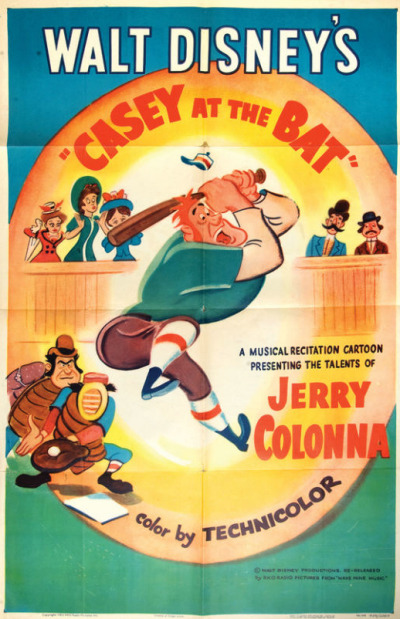




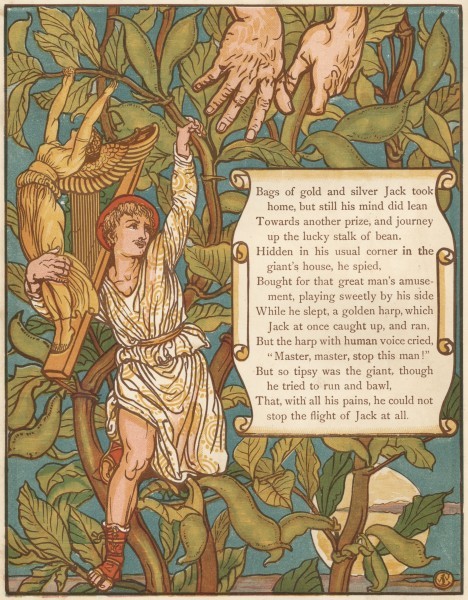

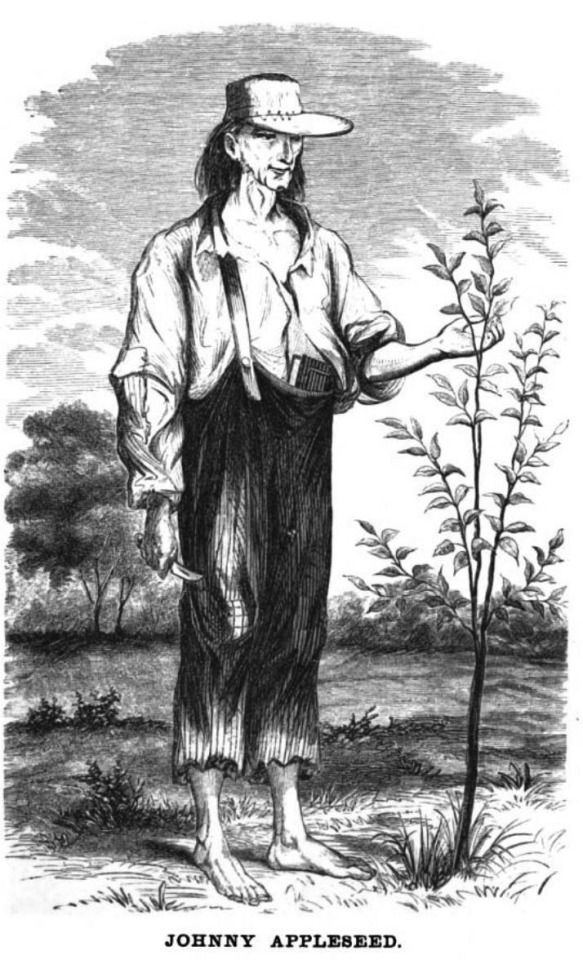


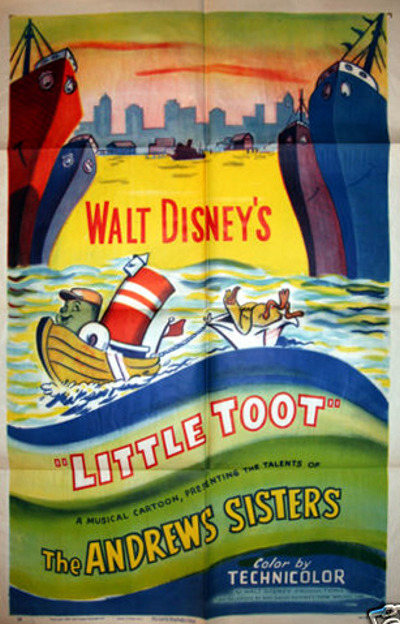


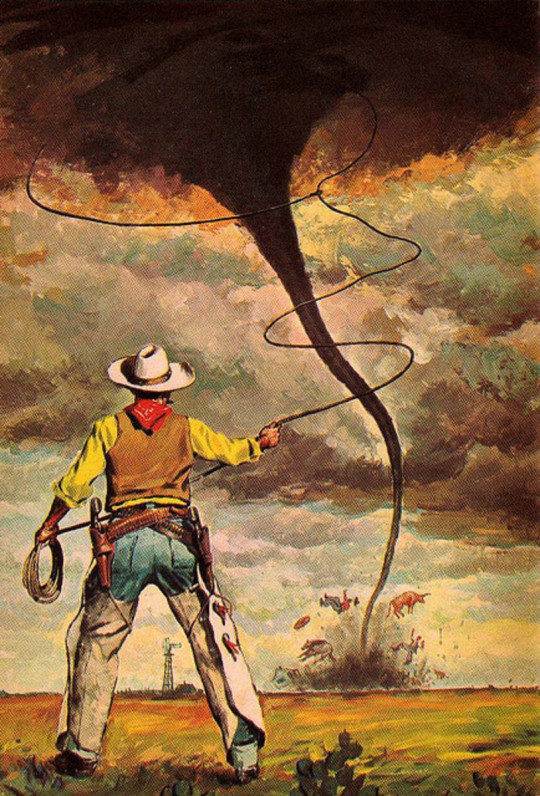





#disney#make mine music#casey at the bat#ernest thayer#peter and the wolf#sergei prokofiev#fun and fancy free#little bear bongo#sinclair lewis#mickey and the beanstalk#round about our coal fire#johnny appleseed#john chapman#little toot#hardie gramatky#trees#joyce kilmer#pecos bill#tex o'reilly#wind in the willows#kenneth grahame#the legend of sleepy hollow#washington irving
18 notes
·
View notes
Text
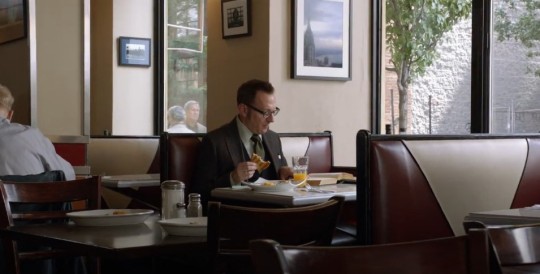
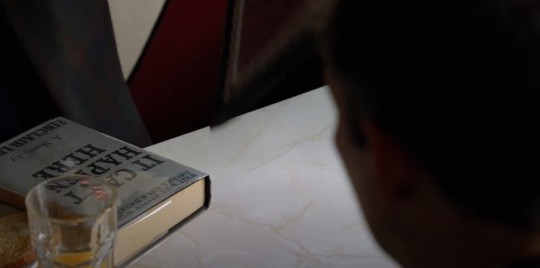
It Can't Happen Here by Sinclair Lewis
Person of Interest: "Judgment"
6 notes
·
View notes
Photo

#my photo#books#book#bookshelf#decor#reader#read#Harper Lee#elmore leonard#sinclair lewis#Laura Lippman#Ellery Lloyd#E. Lockhart#Cassidy Lucas#John D. MacDonald#photography#s20#photographers on tumblr
7 notes
·
View notes
Text
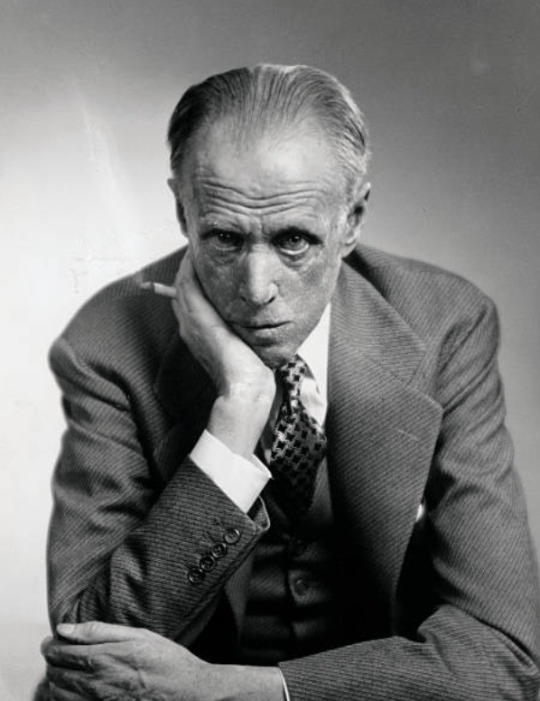
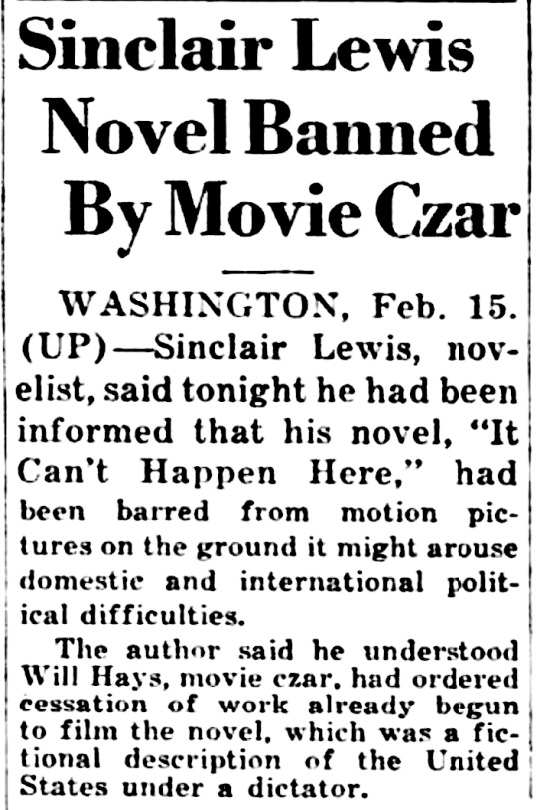

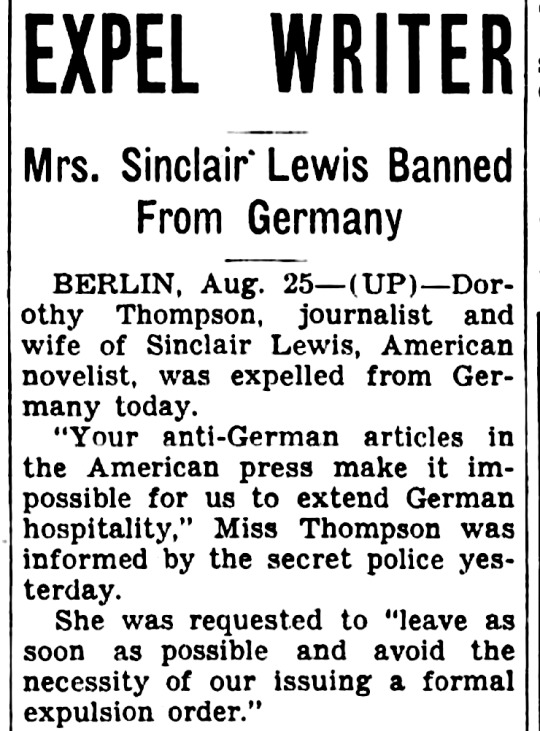
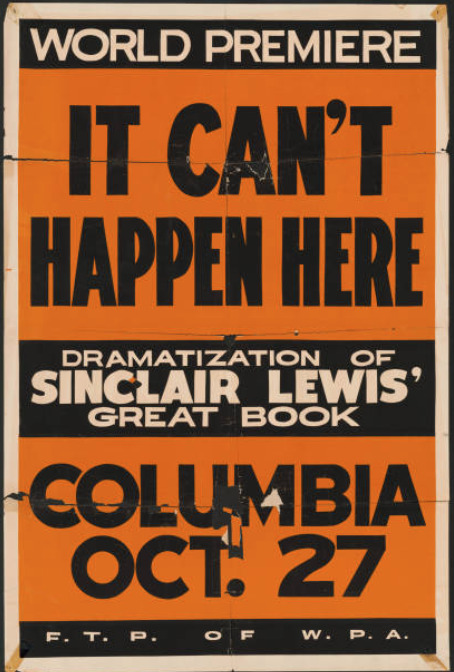

Sinclair Lewis: BANNED
29 notes
·
View notes
Text
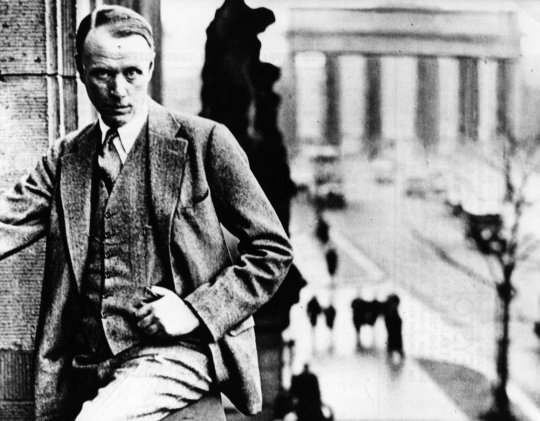
Sinclair Lewis, February 7, 1885 – January 10, 1951.
On the balcony of the Adlon Hotel, ca. 1925.
77 notes
·
View notes
Text
'Yes,' said Leora, with voice, then hungry lips.
-Arrowsmith by Sinclair Lewis; pg. 109.
2 notes
·
View notes
Text
ROUND 1 SIDE B: LOSERS BRACKET

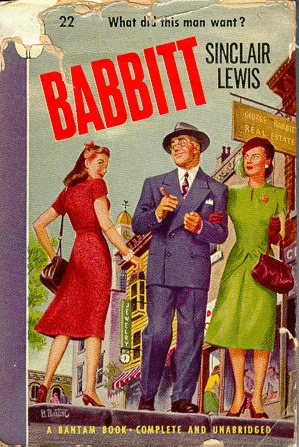
propaganda:
ros and guil: ahahaha they're autos. literally???? ros just wants to make guil happy. he trusts his judgement completely??? they're like a toned-down hamlet and horatio. AND LIKE,,,, THEY ARE A PAIR. TWO OF THEM. THEY MUST NOT BE SEPARATED <3
babbitt:

#gay classic lit losers bracket#tournament poll#l: round 1#l: round 1 side b#rosencrantz and guildenstern are dead#ragad#tom stoppard#babbitt#sinclair lewis#propaganda: babbitt#propaganda: rosguil
3 notes
·
View notes
Text
It has been observed (attributed without source to Sinclair Lewis), that “when fascism comes to America, it will be wrapped in a flag and carrying a cross.“ The GOP proves this more and more.
2 notes
·
View notes